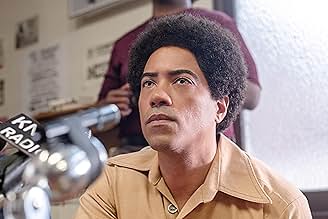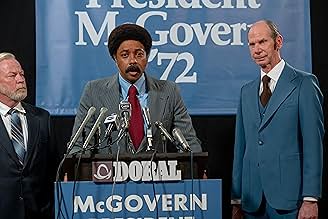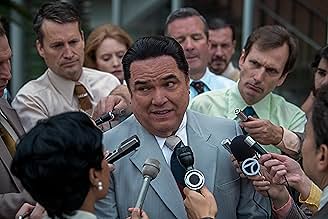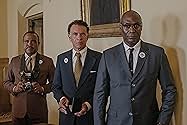IMDb RATING
6.2/10
3.4K
YOUR RATING
Shirley Chisholm makes a trailblazing run for the 1972 Democratic presidential nomination after becoming the first Black woman elected to Congress.Shirley Chisholm makes a trailblazing run for the 1972 Democratic presidential nomination after becoming the first Black woman elected to Congress.Shirley Chisholm makes a trailblazing run for the 1972 Democratic presidential nomination after becoming the first Black woman elected to Congress.
- Awards
- 3 wins & 12 nominations total
Dorian Missick
- Ron Dellums
- (as Dorian Crossmond Missick)
Charlene Willis
- Ruby St. HIl
- (as Charlene R. Willis)
- Director
- Writer
- All cast & crew
- Production, box office & more at IMDbPro
Featured reviews
Shirley's greatest strength is how it shines a light on an underappreciated and pivotal figure in American history whilst emphasising her perseverance. However, it remains frustrating to see these fact based stories told in such a conventional fashion as it would feel like a straight to TV film if it wasn't for the star studded cast.
Regina King gives it her all, embodying Shirley's resilience in a way that carries the film. Terrence Howard and Lucas Hedges do a fine job in their supporting roles and it's a gift to still get to see Lance Reddick being this good in films a year after he passed. It's a true testament to his commitment and work ethic.
John Ridley's direction is mostly fine. Nothing stands out and he's content to let the performances take centre stage. The only aspect that is noticeable is the lighting, which becomes really distracting as it goes along because so many scenes are overly exposed in a way that makes it feel cheap.
Regina King gives it her all, embodying Shirley's resilience in a way that carries the film. Terrence Howard and Lucas Hedges do a fine job in their supporting roles and it's a gift to still get to see Lance Reddick being this good in films a year after he passed. It's a true testament to his commitment and work ethic.
John Ridley's direction is mostly fine. Nothing stands out and he's content to let the performances take centre stage. The only aspect that is noticeable is the lighting, which becomes really distracting as it goes along because so many scenes are overly exposed in a way that makes it feel cheap.
The movie chronicles the efforts of the first black US Congresswoman Shirley Chisholm to get a nomination to run for President of the United States. The incidents in her life in 1971-72 are in focus here and the movie is by no means a biopic. ( I am only focusing on the movie since I have no knowledge of real life incidents relating to her). One can see that an ordinary middle class black lady in US is able to pursue her dream to reach the highest office of the land with hardly any resources at her disposal and how she ruthlessly bulldozes her way in the face of adversities. Her husband doesn't think she has any chances and her sister is upset with the ridicule being heaped upon them by the public in general. She doesn't like her staff using the word " Can't " and she lovingly manipulates people to give in to her plans. She is confident and plucky while displaying a cool demeanor when facing issues .( She is described as 100 lbs of nuclear energy). Watch her in her " never say die" attitude even when she gets around 4% of the votes. She is happy making a beginning for others and considers herself as a catalyst for change.
With some good direction by John Ridley Regina King gives a spirited performance and does project the nuances of her complex character to near perfection. In a way she underplays the role convincingly. Regina's sister Reina plays the role of her on screen sister very effectively.
With some good direction by John Ridley Regina King gives a spirited performance and does project the nuances of her complex character to near perfection. In a way she underplays the role convincingly. Regina's sister Reina plays the role of her on screen sister very effectively.
Congresswoman Shirley Chisholm (Regina King), the first African-American woman elected to the House of Representatives, was an inspiring, trailblazing politician, particularly in the areas of race and gender politics. After winning her seat in Congress in 1968, she later went on to run for the Democratic Party nomination for President in 1972. And that impressive background, one would think, should provide the basis for an engaging, uplifting film biography. Unfortunately, writer-director John Ridley's take on this groundbreaking, often-unappreciated pioneer misses the mark in a number of ways. The biggest problem is a script that tries to cover too much ground in its 1:58:00 runtime, addressing an array of elements from Chisholm's personal and political life and not covering either area particularly well, most notably in the film's first half before settling down in the picture's back end. The narrative jumps around so much that the picture becomes choppy and unfocused - almost incoherent at times - primarily due to some inexplicably mystifying film editing and a lack of sufficient explanation and back story, especially for those who may not know much about the protagonist's life going in. The film also features some rather questionable casting choices, such as the selection of actor W. Earl Brown to portray Alabama Governor George Wallace, who neither looks nor sounds anything like the conservative Southern Democrat who also ran for President in 1972 and was subsequently shot during the campaign. Even King's performance is somewhat uncharacteristically lacking as she struggles mightily to definitively capture Chisholm's singular demeanor and vocal inflections, qualities that sometimes don't always resonate, despite the actress's strong physical resemblance to her character. The real standout here is Lance Reddick, who gives one of his career's best portrayals (as Chisholm's political mentor) in one of his last screen performances. It's disappointing that this inspirational social and political leader hasn't received the worthy cinematic tribute she truly deserves. Perhaps "Shirley" might have worked better as a miniseries than as a standalone vehicle, as that format likely would have provided a better option for more fully telling her story in all of the detail it seeks to depict here. Indeed, for someone who endeavored to rise up to the challenges she faced, it's disheartening that the film seeking to depict that effort doesn't match what she so earnestly sought to accomplish.
"Shirley" (2024) sets out to capture the groundbreaking, albeit unsuccessful, 1972 presidential run of Shirley Chisholm, the first Black woman elected to the United States Congress. The film straddles the line between historical homage and cinematic spectacle with the grace of a tightrope walker in a windstorm. It's commendable in its ambition, like attempting to solve a Rubik's Cube blindfolded - admirable, but you kind of wonder why.
The movie is ok, and by "ok," I mean it's like that lukewarm cup of coffee you forgot about but decide to drink anyway because, well, caffeine is caffeine. The narrative attempts to juggle Chisholm's political struggles, personal trials, and historical context, occasionally dropping the ball but mostly keeping it in the air. The performances are robust, channeling the essence of the 70s so convincingly you can almost smell the vintage cologne and see the questionable fashion choices off-screen. However, at times, it feels like the film is more of a spirited reenactment than a deep dive, skimming the surface like a stone over water, touching on depth but never fully plunging in.
Where "Shirley" shines, though, is in its unwavering commitment to reminding us of a story that deserves to be told, even if it does so with the finesse of a sledgehammer to a nail. It's like watching your dad use a smartphone; the effort is there, the process is painful, but the outcome is mostly what you hoped for. In a sea of historical dramas that take themselves too seriously, "Shirley" is refreshingly self-aware, winking at its audience from time to time with on-the-nose dialogue and scenes that feel like they were directed by someone who binge-watched every political drama on streaming services. In the end, "Shirley" is a decent watch, the kind you'd recommend to a friend with the caveat, "It's interesting, but keep your expectations in check - like, way in check."
The movie is ok, and by "ok," I mean it's like that lukewarm cup of coffee you forgot about but decide to drink anyway because, well, caffeine is caffeine. The narrative attempts to juggle Chisholm's political struggles, personal trials, and historical context, occasionally dropping the ball but mostly keeping it in the air. The performances are robust, channeling the essence of the 70s so convincingly you can almost smell the vintage cologne and see the questionable fashion choices off-screen. However, at times, it feels like the film is more of a spirited reenactment than a deep dive, skimming the surface like a stone over water, touching on depth but never fully plunging in.
Where "Shirley" shines, though, is in its unwavering commitment to reminding us of a story that deserves to be told, even if it does so with the finesse of a sledgehammer to a nail. It's like watching your dad use a smartphone; the effort is there, the process is painful, but the outcome is mostly what you hoped for. In a sea of historical dramas that take themselves too seriously, "Shirley" is refreshingly self-aware, winking at its audience from time to time with on-the-nose dialogue and scenes that feel like they were directed by someone who binge-watched every political drama on streaming services. In the end, "Shirley" is a decent watch, the kind you'd recommend to a friend with the caveat, "It's interesting, but keep your expectations in check - like, way in check."
As "Shirley" (2024 release; 118 min) opens, we are reminded that Brooklyn's Shirley Chisholm was the first Black woman elected to the US Congress, in 1966, among a sea of white males newcomers. We then go to "December, 1971" as Chisholm decides to run for the US presidency in a crowded field and with little chance of actually winning.... At this point we are 10 minutes into the movie.
Couple of comments: this is the latest from writer-director John Ridley (best known for his script for "12 Years A Slave"). Here he looks back at what basically amounts to a footnote in US political history. Question: who was the first Black woman elected to US Congress? Answer: Shirley Chisholm. Question: who was the first Black woman to run for president? Answer: Chisholm again. This film focuses solely on her 1972 presidential run, and hence this is NOT a biopic of Shirley Chisholm. We are given no background or context, none whatsoever, on how this woman got elected to Congress in the first place, or what she did in Congress. As to the movie itself, it struggles to get off the ground, although there are some good moments, in particular towards the end. The movie benefits enormously from the strong lead performance by Regina King ("If Beale Street Could Talk"). Lucas Hedges plays Robert, a national student representative. Bottom line is this: we all know the outcome of Chisholm's 1972 presidential run before we even watch this, so the assumption is that we watch this for the journey, rather than the end result. Turns out that journey isn't all that interesting, even if the concept itself (a Black woman running for president? In 1972? She is DEACDES ahead of her time) is momentous. I'd rather have watched and learned how Chisholm raised to prominence to begin with by getting elected to Congress in the first place. As a complete aside, I must point out that significant chunks of the movie were filmed in Cincinnati (where I live), standing in once again for New York of the 1960-70s (see also Todd Haynes' "Carole"). Also this: couldn't the film makers come up with a sharper movie title than the lame and generic "Shirley"?
"Shirley" received a one week limited theatrical run in Mid-March and then starting streaming on Netflix last week. "Shirley" is currently rated a respectable 70% Certified Fresh on Rotten Tomatoes. That feels a little high to me. "Shirley" is well-meant, for sure, but I'd rather have watched a biopic of this barrier breaking woman. If you have any interest in politics, I'd readily suggest you check this out, and draw your own conclusion.
Couple of comments: this is the latest from writer-director John Ridley (best known for his script for "12 Years A Slave"). Here he looks back at what basically amounts to a footnote in US political history. Question: who was the first Black woman elected to US Congress? Answer: Shirley Chisholm. Question: who was the first Black woman to run for president? Answer: Chisholm again. This film focuses solely on her 1972 presidential run, and hence this is NOT a biopic of Shirley Chisholm. We are given no background or context, none whatsoever, on how this woman got elected to Congress in the first place, or what she did in Congress. As to the movie itself, it struggles to get off the ground, although there are some good moments, in particular towards the end. The movie benefits enormously from the strong lead performance by Regina King ("If Beale Street Could Talk"). Lucas Hedges plays Robert, a national student representative. Bottom line is this: we all know the outcome of Chisholm's 1972 presidential run before we even watch this, so the assumption is that we watch this for the journey, rather than the end result. Turns out that journey isn't all that interesting, even if the concept itself (a Black woman running for president? In 1972? She is DEACDES ahead of her time) is momentous. I'd rather have watched and learned how Chisholm raised to prominence to begin with by getting elected to Congress in the first place. As a complete aside, I must point out that significant chunks of the movie were filmed in Cincinnati (where I live), standing in once again for New York of the 1960-70s (see also Todd Haynes' "Carole"). Also this: couldn't the film makers come up with a sharper movie title than the lame and generic "Shirley"?
"Shirley" received a one week limited theatrical run in Mid-March and then starting streaming on Netflix last week. "Shirley" is currently rated a respectable 70% Certified Fresh on Rotten Tomatoes. That feels a little high to me. "Shirley" is well-meant, for sure, but I'd rather have watched a biopic of this barrier breaking woman. If you have any interest in politics, I'd readily suggest you check this out, and draw your own conclusion.
Did you know
- TriviaOne of Lance Reddick's final films. He died before this film was released.
- GoofsWhen Shirley sits down with Walter while he is having lunch at the restaurant, there is a fork that appears, disappears, reappears, and changes position in his shrimp cocktail depending on the shot.
- Quotes
Shirley Chisholm: If you burn down the Empire, all that's left to rule over are ashes.
- Crazy credits"In loving memory of Lance", at the end titles appears this dedication to actor Lance Reddick.
- ConnectionsFeatures Barbarella (1968)
- SoundtracksSugar
Written by Louis Jerome Hollingsworth
Performed by The Isonics
Courtesy of Resnik Music Group
- How long is Shirley?Powered by Alexa
Details
- Release date
- Country of origin
- Official site
- Language
- Also known as
- Ширлі: Боротьба за Білий дім
- Filming locations
- Production companies
- See more company credits at IMDbPro
- Runtime1 hour 57 minutes
- Color
- Sound mix
- Aspect ratio
- 2.35 : 1
Contribute to this page
Suggest an edit or add missing content






































